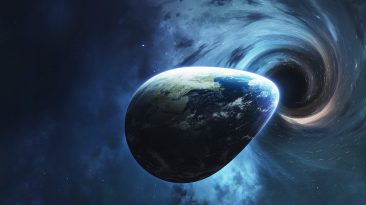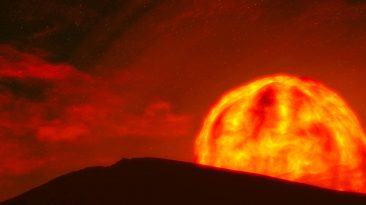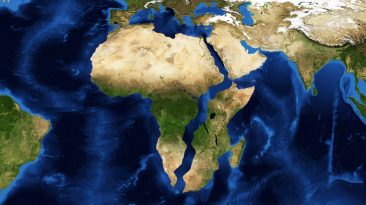There are at least 100 billion galaxies in the observable universe. And there might be many more in the universe that we can’t see.
There are around 500 billion planets in the Milky Way alone, and at least 10 billion of them are Earth-like. All these planets, and yet, we’ve discovered exactly zero alien life forms.
But what if we did? What if NASA announced that they found microbes in the oceans of Europa? Or ancient alien ruins on Venus?
What would that mean to our human civilization here on Earth? Would we consider that good news at all?
[dx_custom_adunit mobile_id=”RTK_v1lP”]Since humans began searching for extraterrestrial life within our Solar System in the 1890s, we’re still waiting to encounter an alien life form. But if we did find one, that would be very bad news. Because in that case we might as well be dead.
Obviously, in this case we’re referring to life which comes from a planet other than Earth, not alien residents of other countries. Humans have speculated about alien life for decades, ranging from simple bacteria to advanced species.
Most of our speculation on alien life is based on the simple fact that the universe is huge. How could we be the only life in the galaxy, let alone the universe?
This logic is based on the Copernican principle. Named for the scientist Nicolaus Copernicus, the principle states that the Earth and the Sun are not observers in the universe, nor are they better or worse than every other planet. Everything that applies to other planets applies to Earth… including life.
[dx_custom_adunit desktop_id=”RTK_CDE4″ mobile_id=”RTK_SUFd”]
Scientists have proposed various ‘habitable zones’, where extraterrestrial life could theoretically live. Billions of ‘Earth-like’ planets have been discovered, but very few have been found in one of these zones which meet the criteria for life.
These zones require solvent water, which is a necessity for life on Earth.
So, what if the aliens invaded? It wouldn’t look anything like the alien invasion you might imagine. Nobody would blast their super advanced weapons at us… Hopefully not.
Even if they did, it wouldn’t be that much of a problem. Because by the time we found alien life, we’d already be on our way to self-destruction. All because of the Great Filter. But what kind of filter is capable to kill our entire civilization? And why?
Let’s back up a little bit. Basic probability asserts that alien life must exist somewhere in the Universe. If that were the case, wouldn’t we be able to see some signs of life out there? But we don’t. The Universe seems endlessly empty.
It’s this contradiction that has been blowing scientists’ minds ever since they realized that the Universe is very, very big. They called it the Fermi paradox. It also says that all species in the Universe go through the same evolutionary path, no matter where they’re from.
First, the development of life anywhere in the Universe starts with the right star system and a planet that has just the right conditions.
Then organic compounds assemble themselves into self-replicating patterns and eventually evolve into more complex multi-cell organisms. All the way up to the species with the big brain, that eventually take over their own planet and change it according to their needs. Here on Earth, that happens to be us, humans.
Then there’s the last step – space colonization. That could happen for many reasons – overpopulation and the need to spread out to survive, conquest of solar systems one after another, or even simple curiosity. Whatever the reason is, all civilizations will end up trying to colonize space.
Some alien species may have been around for billions of years longer than us. But they still haven’t shown up here on Earth. Looks like something is making it very hard to colonize a galaxy, maybe even impossible. The Great Filter. Yes, the thing that might wipe out all of humanity.
It’s something very dangerous, something that happens to every civilization that is advanced enough to go beyond their planet. One of the steps on everyone’s evolutionary path. Something that takes maybe billions of years to go through.
Having never met life on other planets means that the hypothesized Great Filter didn’t wipe us out. Instead, we might be the first civilization to pass it safely, and the first to reach this level of technology in the entire Universe.
But, just because we haven’t seen them, doesn’t mean they don’t exist, or never existed…. There’s a chance some aggressive alien species might have been on the way to Earth to destroy us all. But since they never showed up on our planet, that means something destroyed their entire civilization before they even reached Earth. The Great Filter?
It doesn’t look we’re going to find anyone as advanced as we are. If there was a more advanced civilization than ours, we’d know it by now. The most we can hope for is bacteria on Mars, or multicellular animals in the oceans of Europa.
Both options would be disturbing, but the worst thing to find would be the ancient ruins of an advanced alien civilization.
Because if they didn’t get past the Great Filter, neither did we. The only difference is that they are long dead, and we are just on our way to self-destruction.
The more complex and advanced the discovered alien life was, the more likely it would mean we’re behind the Great Filter.
Maybe that filter starts once the species take control over their own planet?
AI destroying its creator… Experiments that blow up the whole planet… Genetic engineering gone wrong… Climate change…It could be anything. It might have happened to those dead alien civilizations, and might happen to us, too.
Alien life might sound like the most exciting discovery of our time. However, it may be better for us if the Universe is absolutely sterile, and there are billions of new planets to be discovered and terraformed.
Subscribe to What-If on Youtube or follow the show on Facebook Watch.
Sources
- Why Alien Life Would be our Doom – The Great Filter
- The Flip Side of Optimism About Life on Other Planets
- Existential Risks: Analyzing Human Extinction Scenarios and Related Hazards
- There’s a compelling reason we’ve never found aliens – and it could mean humanity is doomed.
- Are We Alone In The Universe?
- The Copernican Principle



























